Why Bringing Pill Bottles to Your Appointment Matters More Than You Think
It’s not enough to say you take "that blue pill twice a day." Your doctor needs to see the actual bottle - label, expiration date, and all. Medication reconciliation isn’t just a checklist item; it’s a safety net. Nearly 70% of medication errors happen when patients move between care settings - from hospital to home, or from one doctor to another. And the biggest reason? Incomplete or inaccurate lists. When you bring your actual pill bottles to an appointment, you cut those errors by over 67%. That’s not a small win. That’s the difference between a routine visit and a preventable hospital stay.
What Exactly Should You Bring?
You don’t just bring your prescription meds. Bring everything. That means:
- All prescription bottles, even if you haven’t taken them in months
- Over-the-counter pills - pain relievers, sleep aids, antacids
- Vitamins and supplements - even the ones you think are "harmless"
- Herbal remedies and teas with active ingredients
- Any pills in pill organizers, but only after you’ve also brought the original bottles they came from
Why? Because people forget. Or they stop taking something but keep the bottle. Or they switch brands and don’t realize the dosage changed. A 2023 study found that 38% of patients dump all their pills into one container - maybe a weekly pill case - and lose track of what’s what. Without the original labels, your doctor can’t tell if that white oval is 5mg lisinopril or 10mg metoprolol. Mistake? Easy. Dangerous? Absolutely.
The Brown Bag Method: Simple, Proven, and Effective
There’s a reason clinics call it the "brown bag review." It’s old-school, but it works. The day before your appointment, grab a plain paper bag - no need to be fancy - and toss in every single medication container you have at home. Don’t sort. Don’t throw out empties. Don’t decide what’s "important." Just bring it all.
Why does this work? Because it forces honesty. You can’t pretend you’re not taking that old painkiller your aunt gave you. You can’t say you "only take aspirin when needed" if you’ve got a half-empty bottle of naproxen in the back of your drawer. One study showed practices using this method cut reconciliation time by 38% and boosted accuracy to over 89% when paired with pharmacy records.
Pro tip: If you’re worried about clutter, take a photo of each label before you throw anything away. That way, even if you’ve tossed a bottle, you still have the info. Many apps like Medisafe or MyTherapy can scan and store these automatically.
What About Pill Organizers? Don’t Rely on Them Alone
Weekly pill cases are great for remembering to take your meds. But they’re terrible for telling your doctor what you’re actually taking. A 2023 study of 22 older adults found that 77% used pill organizers - but only 23% kept medications in their original bottles. That’s a problem.
Imagine your organizer has 12 pills in the Monday slot. Your doctor sees it and assumes you’re taking 12 different drugs. But what if five of them are just aspirin? What if two are old antibiotics you stopped? Without the original labels, they can’t tell. And if you’ve mixed your blood pressure pill with your cholesterol pill and your vitamin D? That’s a recipe for confusion - and risk.
Bring the organizer, yes. But also bring the bottles it came from. Your pharmacist or nurse can match the pills inside to the original prescriptions. That’s how they catch duplicates, wrong dosages, or drugs that shouldn’t be taken together.
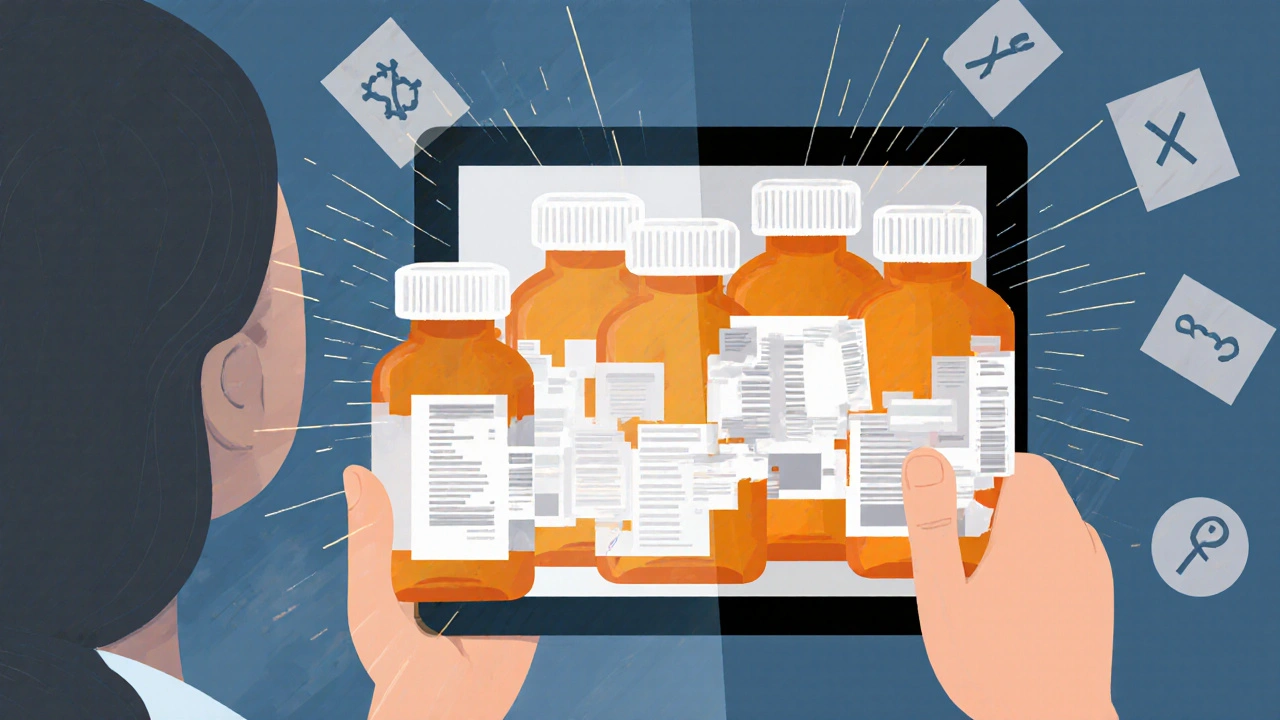
What If You’ve Stopped Taking Something?
Don’t throw it away. Keep it. Even if it’s expired. Even if it’s been sitting in your cabinet for two years. That bottle tells your doctor something critical: you were prescribed this. You might have stopped because it made you dizzy. Or it cost too much. Or you thought it wasn’t working. All of that matters.
One nurse in Manchester told me about a patient who came in with a bottle of warfarin - an old blood thinner - she hadn’t taken in 18 months. The doctor realized her new cardiologist had switched her to a different drug but never updated the record. Without that bottle, she would’ve been on two blood thinners at once. A deadly mix.
Pharmacists say 63% of patients throw out empty bottles. That’s a huge blind spot. If you’ve tossed the bottle, take a photo of the label before you do. Or write down the name, dose, and why you stopped. But don’t skip bringing it. That’s not clutter - that’s your medical history.
Telehealth Visits? You Can Still Do This
Yes, you can do a pill bottle review over Zoom. Hold each bottle up to the camera. Show the label clearly. Say the name out loud. Tell your doctor when you last took it. But here’s the catch: virtual checks miss things.
Can your doctor see if you’ve got two different bottles of the same drug? Can they spot if the pills in your organizer don’t match the label? Can they tell if you’ve got a bottle of pills that’s been sitting in a hot car for weeks? Probably not. Studies show telehealth pill reviews miss 22% of discrepancies that in-person checks catch.
Still, if you’re homebound or in a rural area, it’s better than nothing. Just be extra clear. Don’t just say "I take this." Say: "This is my metformin, 500mg, from CVS, expired in June 2025. I take one daily after breakfast. I’ve been taking it since 2022."
Why Doctors Don’t Always Ask - But They Should
Here’s the uncomfortable truth: many doctors don’t routinely ask for pill bottles. They rely on electronic records or what patients say. But those are flawed. A 2024 report from the American Academy of Family Physicians found that 73% of primary care doctors now use medication reconciliation as standard - but only if the patient brings the bottles. Without them, it’s guesswork.
Older adults are at highest risk. Nearly 47% of people over 65 take five or more medications. That’s called polypharmacy. And it’s where mistakes multiply. The American Geriatrics Society says 56% of inappropriate medications in seniors are only found by physically checking the bottles - not by asking.
So if your doctor doesn’t ask, ask them. Say: "I’ve brought all my medications in case you want to check them. I want to make sure nothing’s conflicting." That’s not being pushy. That’s being smart.
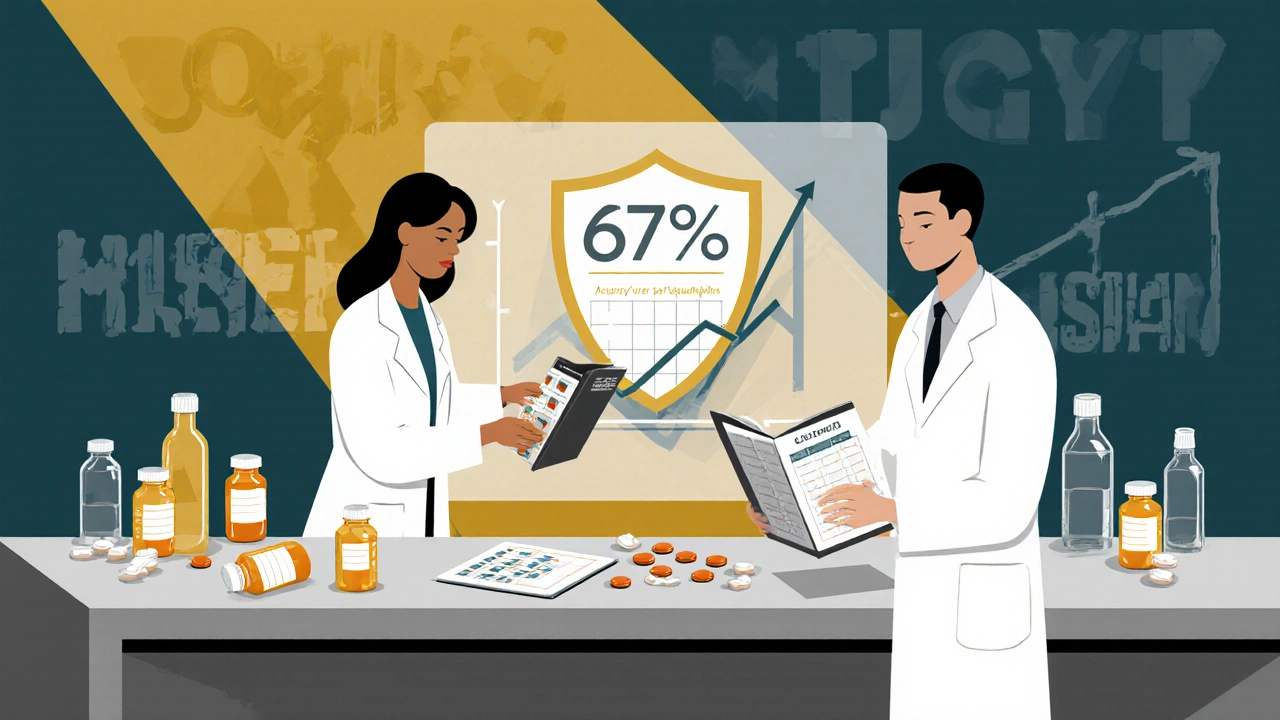
What Happens When You Do This Right?
Real results happen. One clinic in Salford started requiring pill bottles at every visit for patients over 65. Within six months, adverse drug events dropped by 32%. One patient was on a blood thinner and an NSAID together - a combo that can cause internal bleeding. The doctor caught it because the patient brought the bottles. Another was taking two different antidepressants with the same active ingredient - a dangerous double dose. Again, the bottles gave it away.
Patients report feeling more in control. They’re not guessing what their meds are for. They’re not embarrassed about unused pills. They’re not afraid to say, "I don’t know what this one is." That’s huge. A 2024 survey found 19% of patients admitted they didn’t know what most of their pills were for. That’s not ignorance - it’s poor communication. Bringing bottles fixes that.
What to Do Before Your Appointment
Here’s a simple checklist to follow 24 hours before your visit:
- Find every pill bottle, box, or container in your home - bathroom, kitchen, nightstand, purse, car.
- Don’t throw anything out. Keep expired, empty, or discontinued bottles.
- If you use a pill organizer, lay it out next to the original bottles.
- Take photos of any labels you might toss.
- Put everything in one bag - a brown paper bag works best.
- Write down any questions: "Why am I taking this?" "Can I stop this?" "Is this still needed?"
Spending 15 to 20 minutes doing this can save you hours - or even your life.
What If You’re Overwhelmed?
If you have 15 bottles and feel like you’re bringing a pharmacy to your appointment, you’re not alone. One Reddit user said their mother brings so many bottles, the clinic staff groans. But here’s the thing: the staff groans because they’re overwhelmed by the risk - not the clutter. They’d rather see the bottles than risk a mistake.
If it’s too much, ask your pharmacist to help. Many pharmacies offer free medication reviews. They can sort your pills, check for interactions, and even make a printed list for you to bring. Some even offer free pill organizers labeled with your meds.
And if you’re still nervous? Say this: "I want to make sure I’m safe. I’ve brought everything so you can see exactly what I’m taking." That’s not awkward. It’s responsible.
Final Thought: The Bottle Is the Truth
No app, no EHR, no patient memory is as reliable as the bottle on your counter. The label has the drug name, strength, instructions, expiration, and prescriber - all verified by the FDA. Nothing else gives you that. It’s the Rosetta Stone of medication safety.
Bring your bottles. Even if you think it’s unnecessary. Even if you’re "sure" you know what you’re taking. Even if it’s inconvenient. Because when it comes to your health, convenience doesn’t matter. Accuracy does.
Do I need to bring every pill bottle, even if I haven’t used it in years?
Yes. Even if you stopped taking a medication months or years ago, keep the bottle. It tells your doctor what you were prescribed and why you might have stopped - whether it was side effects, cost, or confusion. Many dangerous interactions or duplicate prescriptions are only caught by seeing old bottles.
Can I just show my phone’s medication list instead?
Not reliably. Phone lists are only as good as what you or your pharmacy entered. They often miss over-the-counter drugs, supplements, or medications you stopped taking. A 2023 study showed patient-reported lists miss over 60% of discrepancies. Original bottles have FDA-approved labels - that’s the gold standard.
What if my pills are in a weekly organizer? Do I still need the bottles?
Yes. Pill organizers are great for remembering to take your meds, but they hide the details. You can’t tell the dosage, manufacturer, or expiration date from a pill in a case. Bring both the organizer and the original bottles so your doctor can match them up.
Should I bring vitamins and supplements?
Absolutely. Many supplements interact with prescription drugs. For example, St. John’s Wort can reduce the effectiveness of blood thinners and antidepressants. Even "natural" products can be risky. Your doctor needs to know everything you’re putting in your body.
What if I don’t know what a pill is for?
That’s completely normal - and bringing the bottle is the best way to find out. Many patients don’t know why they’re on certain meds, especially if they’ve been taking them for years. Your doctor can use the label to identify it and explain its purpose. Don’t be embarrassed. This is exactly why they ask for the bottles.
Is this only for older adults?
No. While older adults are at higher risk due to polypharmacy, anyone taking multiple medications - even just three or four - should bring their bottles. Chronic conditions like diabetes, high blood pressure, or depression often require several drugs. Medication errors happen at any age.
Can I bring digital photos of the labels instead of the bottles?
Photos are better than nothing, but they’re not a replacement. Labels can be blurry, cropped, or taken in bad lighting. The original bottle has the lot number, pharmacy info, and exact instructions - things you can’t always see in a photo. Use photos as backup, but bring the real bottles if you can.
What if I’m nervous about what the doctor will think if I have unused meds?
Doctors aren’t judging you - they’re protecting you. Having unused meds is common. Maybe you switched doctors. Maybe a side effect made you stop. Maybe you couldn’t afford it. Bringing them helps your doctor understand your history and avoid prescribing something you’ve already tried and rejected. It’s not a sign of disorganization - it’s a sign you’re trying to be safe.
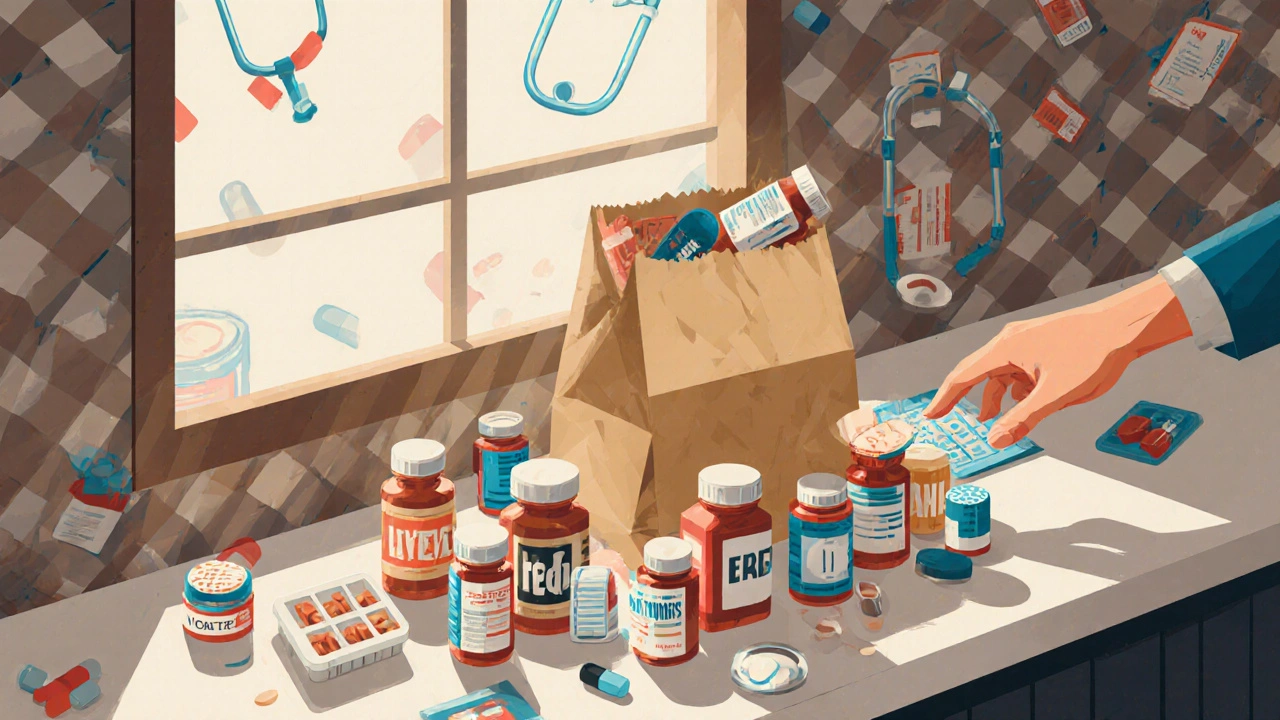


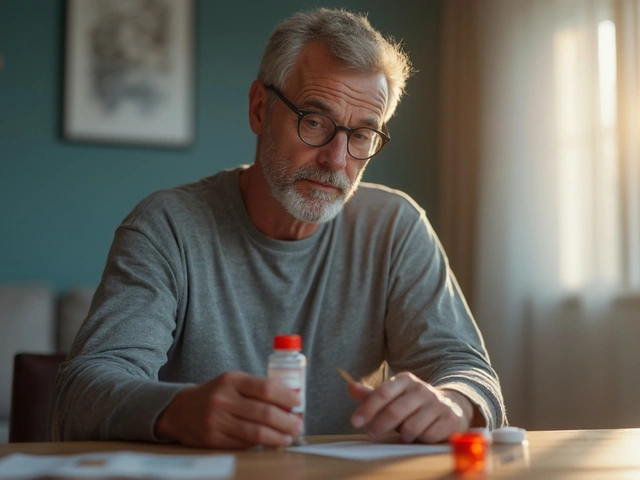
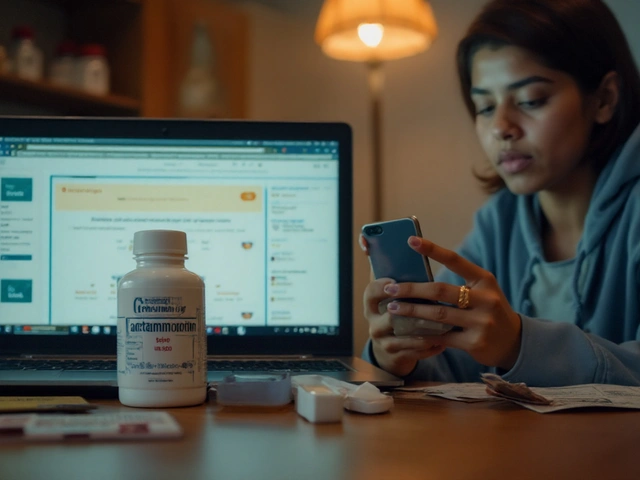
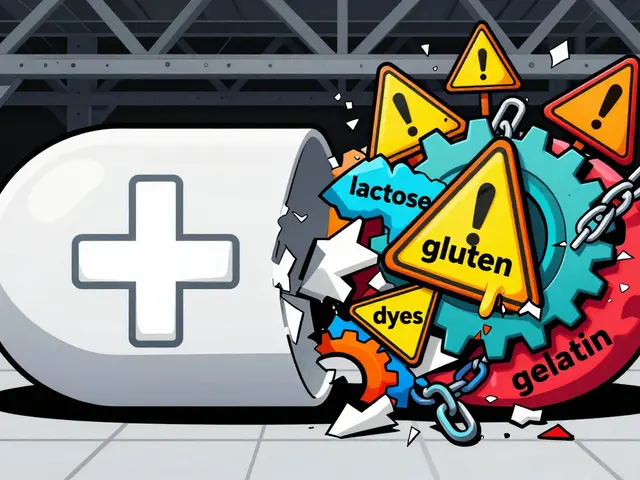
I brought my whole medicine cabinet to my last appointment and the nurse literally cheered. 🎉 I thought I was being dramatic, but turns out I saved myself from a dangerous interaction between my blood pressure med and that ‘harmless’ turmeric supplement. Doctors don’t ask? Fine. I’ll just show up with a shopping cart full of bottles. 😘
November 21Corra Hathaway